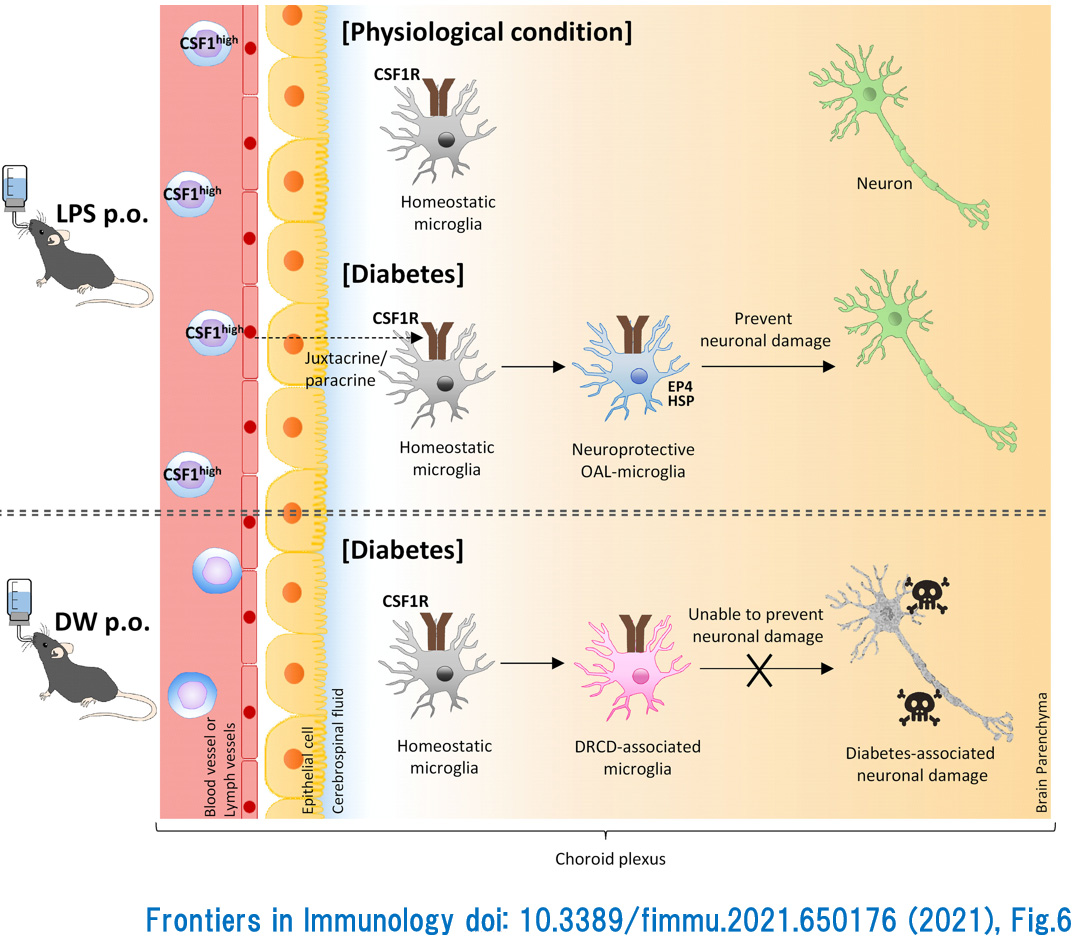




In 2018, Kobayashi et al. reported that oral administration of Pantoea agglomerans Lipopolysaccharide (LPSp) has a preventive effect on age-related dementia (*1). Using an accelerated aging mouse model, Kobayashi et al. showed that oral administration of LPSp significantly reduced amount of brain amyloid-β and memory impairment as seen in the water maze test (https://www.macrophi.co.jp/english/lps/2–7.html).

Subsequently, in 2021, Mizobuchi et al. reported that oral administration of LPSp had a preventive effect on diabetes-related dementia (*2). In a model of diabetic dementia induced by intracerebroventricular administration of streptozotocin in mice, Mizobuchi et al. reported that oral administration of LPSp inhibited atrophy of the cerebral cortex and phosphorylation of tau protein—which is associated with dementia—and suppressed the decline in learning ability and memory, as evidenced in the water maze test. In both Kobayashi and Mizobuchi's studies, no side effects, such as weight loss or inflammation, were observed with oral administration of LPSp.
The dosage of LPSp used in the above study was ~1 mg/kg/day, but at this dosage, LPSp was undetectable in the blood (*2). Therefore, LPSp was not directly transferred to the blood or transported to the brain. So, why does the oral administration of LPSp affect events in the brain at a distance?
To answer this question, Mizobuchi and colleagues reported the following vital finding: oral administration of LPSp elevated membrane-bound colony-stimulating factor 1 (mCSF1) in peripheral white blood cells. Originally, CSF was discovered to be a factor that promotes the proliferation and differentiation of macrophages and monocytes. Microglia, macrophages in the brain, also proliferate when stimulated by CSF1; however, their neuroprotective effects become enhanced (*3). Considering these facts, it is possible that orally administered LPS first activates macrophages and other immune cells in the gastrointestinal mucosa, and that this activation leads to the expression of mCSF1 in leukocytes, and that the leukocytes with increased mCSF1 expression stimulate the microglia during blood circulation. This mechanism is expected to enhance the neuroprotective effect of microglia.

Oral administration of LPSp was reported to have preventive and ameliorative effects on various diseases other than dementia (*4). However, until now, the mechanism of this effect remains unclear. The findings reported by Mizobuchi et al., i.e., mCSF1 is expressed in leukocytes, may clarify the mechanism of action of orally administered LPSp. Incidentally, there are two types of CSF, free and membrane-bound. It is interesting to note that only membrane-bound CSF is upregulated in leukocytes after oral administration of LPSp. The free form of CSF is distributed throughout the body through the bloodstream, but the membrane-bound form transmits signals only through cell-to-cell contact. What implications this may have, we await further research.
(*1) Oral administration of Pantoea agglomerans derived lipopolysaccharide prevents metabolic dysfunction and Alzheimer's disease-related memory loss in senescence accelerated prone 8 (SAMP8) mice fed a high-fat diet.
PLoS One 1. 13 (6): e0198493 (2018)
(*2) Prevention of diabetes-associated cognitive dysfunction through oral administration of lipopolysaccharide derived from Pantoea agglomerans.
Frontiers in Immunology doi: 10.3389/fimmu.2021.650176 (2021)
(*3) Microglia overexpressing the macrophage colony-stimulating factor receptor are neuroprotective in a microglial-hippocampal organotypic coculture system.
J Neurosci 25: 4442–4451 (2005)
(*4) Applications of lipopolysaccharide derived from Pantoea agglomerans (IP-PA1) for health care based on macrophage network theory.
J Biosci Bioeng. 102 (6): 485-496 (2006)

DynaxT bldg. 2F, 2217-6
Hayashi-cho, Takamatsu-shi,
Kagawa-ken,
761-0301 Japan
TEL : +81-87-867-7712
FAX : +81-87-867-7737
Your personal information on this site is protected by SSL.